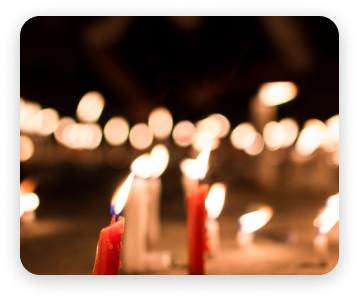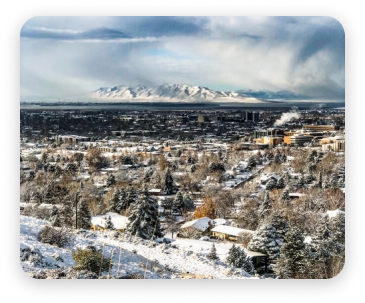Provo Burial Service Options and Information
Nelson Family Mortuary is where families come when they need burial services!
Nelson Family Mortuary has been providing Provo burial services to families in need for many years, and hopes that you choose to say goodbye to your loved one with us. One of the reasons that Provo families come to us in their time of need is because we care about making sure that they understand everything there is to know about the burial service options we have.
Part of how we do that is by providing you with as much information as possible, so that you can make an informed decision. That being said we’d like you to take some time to go through the information pages that we have put together. If you know the basics then some of them won’t be needed, but we find that it is very helpful to educate yourself on burial services if it is something you are considering for yourself, or your loved one.
Nelson Family Mortuary has all the information about burial services that you need.
To learn about the burial services that we offer you can take a look at both the Provo funeral services page, and the one we wrote simply to showcase our burial services. If you’re looking to learn more about how to plan a burial service there is a page about that too.
Our Funeral Service Guide
Loss affects everyone differently and how we choose to honor a loved one is as unique as the individual. For families everywhere, a funeral service can mean many different things. For example, one family may feel that a traditional funeral service is the only way to honor a loved one. At the same time, another family may find that a celebration of life service is more suitable. Instead, they want to hold a less formal funeral ceremony.
Whatever the case, we offer a selection of different funeral options to suit every family’s needs and budget. Each year we help families throughout Provo and Utah county honor their loved one with quality funeral services.
When it comes to honoring a loved one, there are many options to consider. Our caring and considerate staff will gladly meet with you to discuss the different funeral services we offer. Whether it’s a more traditional funeral service that you desire or a less formal and more personalized funeral ceremony, we can accommodate your needs.
We invite you to read further to learn the simple answer to the question "what is a funeral?". Should you have questions about what you read here, we encourage you to call us at 801-405-7444. One of our funeral professionals will be delighted to explore the commonalities behind the wide spectrum of funeral ceremonies seen around the world.

What is a Funeral?
No matter where it's held, a funeral is a structured ceremony, with a beginning, middle and end. Each is intended to engage the living participants in activities that will transform their status within the community, provide mourners with a collective grieving experience, and celebrate a life lived. It's a socially-acceptable way for members of a community to re-affirm and express their social attachments.
Funeral Service Components
Visitation: This is often called a viewing or a wake. Guests come to pay their respects to the deceased by viewing their casketed body and spending time with the grieving family. A visitation can occur at any time before the funeral service.
Funeral Ceremony: This event commonly takes place at the funeral home, a church, or at the graveside. It can include music, the reading of literary or religious passages, a eulogy, prayer, and the singing of hymns.
Committal Service: If the family plans to bury the deceased, this stage involves the vehicle procession to the cemetery. Funeral Reception: Many choose to host this post-service gathering (or repast) at a reception hall. This is considered a time to share memories, laughter, and support.
A funeral service, whether traditional or more modern (memorial service or celebration-of-life), has two functions: to acknowledge the death and lifetime achievements of an individual and to bring grieving family members and friends together in support of one another during this difficult time.


Quality Funeral Services in Provo UT
Our Provo funeral options vary from simple graveside services to traditional funeral services with a visitation. Included within every package is the basic services of the funeral director (arrangement/administration), transfer of the remains, and preparation of the deceased for the funeral service.
Depending on the funeral option you select, additional services may be included. For instance, our platinum package includes services for those wanting more time to greet friends and family. It provides the opportunity for an evening visitation for those who cannot attend the funeral service the next day.
Funeral Services in Our Area
For families and individuals living in Provo UT (as elsewhere in the nation), a funeral service can mean many things. Fortunately, thanks to a number of unique social forces, there are alternatives. Today, end-of-life commemorative services range from the traditional funeral to a memorial service and the increasingly popular celebrations of life. If you have yet to realize the immense value of such a collective acknowledgment of loss, reach out to us. Call (801) 405-7444 to speak with one of our experienced funeral service professionals.
For more information about our funeral packages, please visit our Traditional Funeral Packages Page.
If your family is in need of funeral services in Provo or the surrounding areas of Orem or Park City, please feel free to contact us. As the trusted provider of quality funeral services in Utah County, our staff would be happy to speak with you and answer any questions you may have.
Call us at (801) 405-7444 to speak with one of our experienced funeral service professionals today! View Our Pricing
Utah County
Burial Services
The earliest human burial service dates back 100,000 years making it one of the longest-lived and most widespread of traditions. For an overview of the many different burial traditions, check out the websites in the Resources section below.
Understanding Our Burial Services in Utah County
Here at Nelson Family Mortuary, we have the deepest respect for this traditional practice. If you are interested in learning more about our affordable burial service, please review the following information. Should you have questions about anything, please call us at (801) 405-7444, affordable burial service in Utah county flowers
There are many things to consider when deciding whether to bury a recently deceased loved one or when selecting burial during funeral pre-planning. One of the first decisions you'll need to make involves choosing both the cemetery and the specific place of burial service within its grounds. You'll then need to select a casket and possibly a burial vault, as many modern cemeteries require their use. At some point, and this does not have to take place right away, the decision becomes one of selecting the headstone or marker and writing the inscription. A member of our professional staff will be available should you wish to have assistance in making each of these decisions. If you're considering an affordable cremation service we have a page to compare that option as well.
An Open Invitation
We offer a number of affordable burial service options. They range from simple burials where only a member of our staff oversees the internment; simple graveside services led by a minister or celebrant; and a traditional funeral service followed by burial. Each can be tailored to meet the needs and expectations of today's price-conscious families.
Why Choose Burial
One of the most common questions we get asked is “why choose burial over cremation?”. If you are undecided we have provided a list of benefits of choosing burial to help simplify your decision. There is a wide variety of reasons why someone would choose burial, however the reasons listed below are what we have found to be the most common.
Funeral Service Questions
Is a burial service the right choice in your situation? Our overriding goal in developing this website has been to empower the families and individuals living in our community. We want them to come to us prepared to speak about their wishes, and that means giving them the quality of information they need in order to do that. After all, everyone needs enough background knowledge to speak confidently about their options. We're always delighted to answer your questions, and should we have neglected to include your particular question about burial services in general, or the specific burial services we offer; we urge you to call us at (801) 405-7444.






